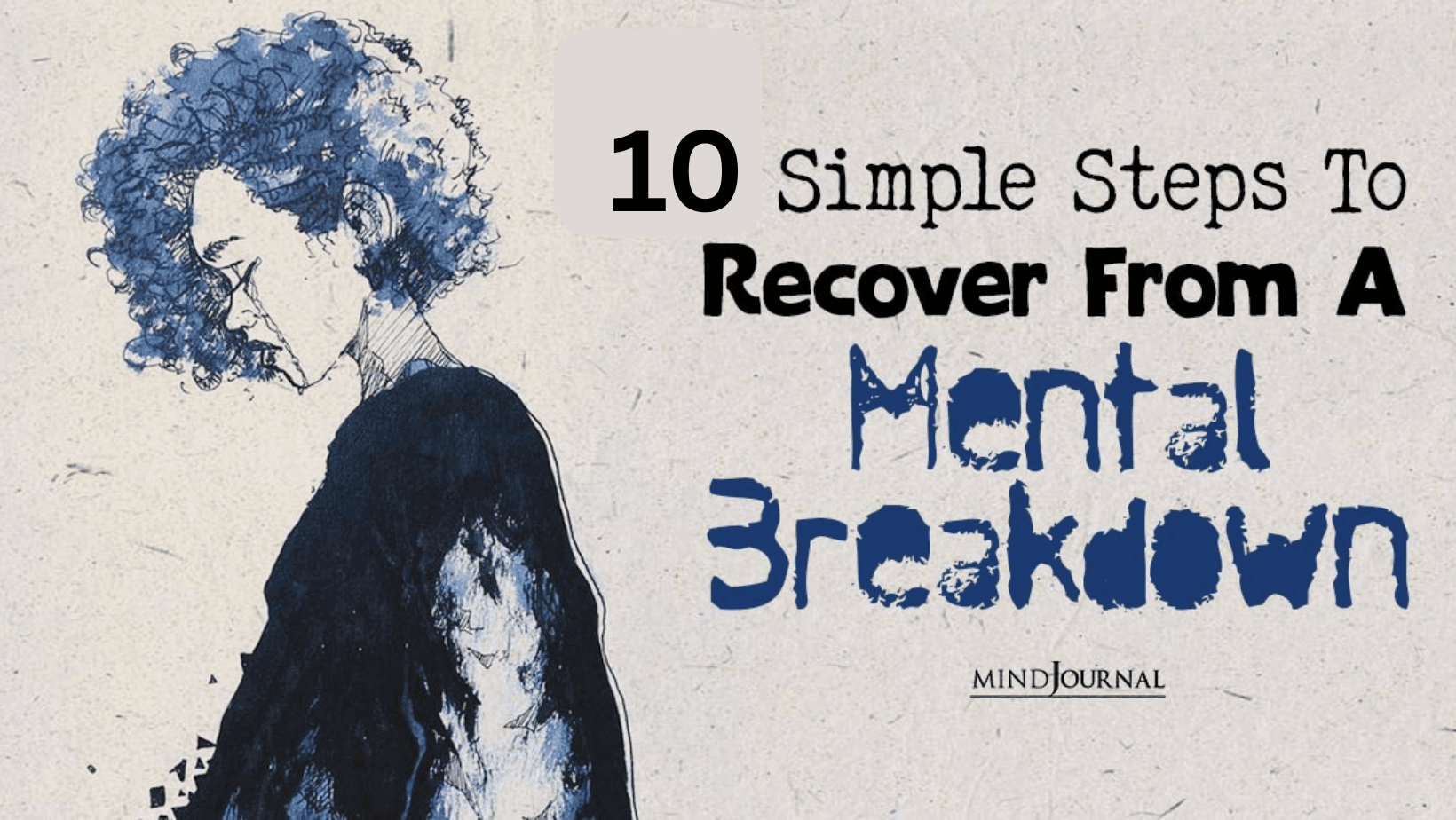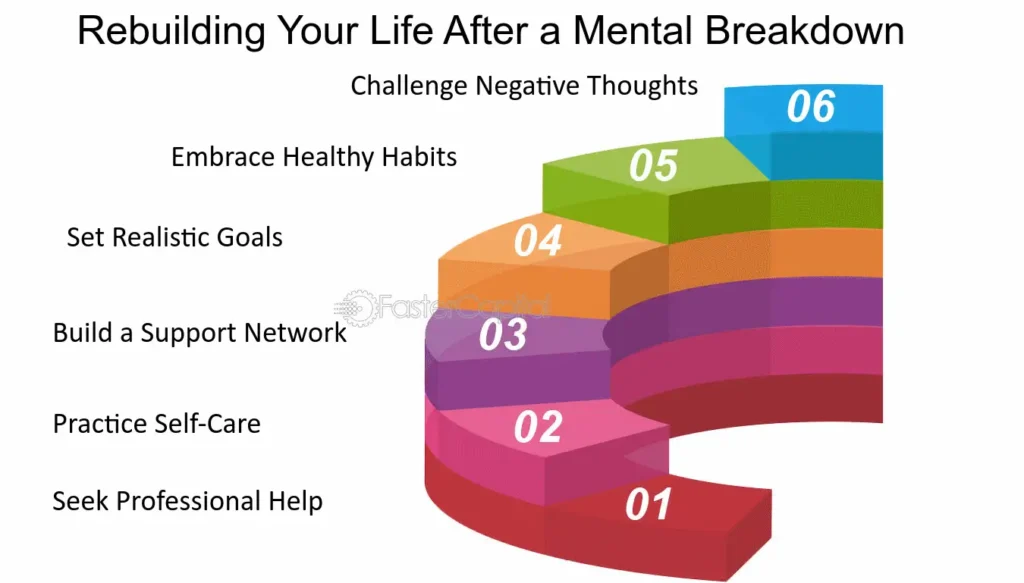
Introduction
Life can break us in ways we don’t expect. Someone may go missing, a partner may betray our trust, or we may encounter a failure that shakes our heart. Often, during breakdowns, a person feels empty and lost. Negative and debilitating thoughts may run through their mind non-stop, even small things can feel heavy, and those feelings/situations will persist even though we might want them to go away. Both Islam and psychology teach that healing is possible.
1. Commit to Self-Compassion
After nearly every mental health breakdown, most people are ever-ready with several self-blaming words: “I failed. I am worthless.” When students make mistakes, their critical self-talk escalates the pain. Instead of blaming themselves, psychology suggests self-compassion instead. The research of Dr Kristin Neff suggests that self-kindness fosters the healing process and is an important and helpful tool.
To use this tool, treat yourself the same way you would treat your friend. Instead of the negative words, substitute soft words. In Islam, Allah is Ar-Rahman (The Most Merciful).
Read more: How Isolation Causes Brain to Shrink

2. Reframe Negative Thoughts
Breakdowns thrive on negative thinking. Our mind tells us “Nothing is going to change”. Your mind makes you feel hopeless. Psychology offers Cognitive Behavioral Therapy (CBT), which is based on the idea of transforming negative thinking into more realistic thinking.
Instead of saying “I will always be miserable”, say, “I am slowly healing”. This change will make you resilient, as the Qur’an reminds us: “Indeed, with hardship comes ease” (Surah Ash-Sharh 94:6). Every hardship has within it the seeds of relief.
Islamic Case Study: After losing his beloved son, Prophet Yaqub (AS) said, “So patience is most fitting” (Surah Yusuf 12:18). So, He made sure that he was thinking positively to allow for the possibilities of hope.
3. Establish Daily Routines
After a breakdown, life is chaotic. Days can run into evenings without any structure. Start small. Get up at a set time. Read the Qur’an after the Fajr prayer. Also, go for a walk every day. Over the long run, these small habits will help you restore order. Additionally, Islam promotes a sense of discipline. Even the five daily prayers create a natural routine.
4. Take Time to be Mindful
Breakdowns of the body and mind often entrap individuals in negative thoughts of the past or the future. They usually replay old pain, or even fear what is next. Islam is also about being present. During salah, a believer is aware and fully present with Allah, blocking earthly distractions. This mindfulness in worship heals the believer’s soul.
Case study: A young teacher recovering from burnout had a mindfulness practice of mindful breathing every day for two weeks. So, she wanted to feel calmer and avoid going back into an anxious state. Over time, she regained focus and inner peace.

5. Express Emotions Safely
After breakdowns, many people compartmentalize and store their emotions deep down. They pretend to be strong while internally they are bleeding. Islam also accepts emotion. So, even the prophets expressed grief. For example, Prophet Yaqub (AS) cried for his son until his eyes became completely white (Surah Yusuf 12:84).
Case study: A student in college recovering from trauma started writing letters to herself. As someone who used journaling as a safe way to relieve grief, this allowed her to begin to understand her pain.
6. Seek Professional Help
Research in psychology clearly shows that therapy will expedite the healing process when you consider an emotional breakdown instead of having no help at all.
In Islam, seeking help is encouraged. The Prophet (ﷺ) advised: “Use medical treatment, for Allah did not send down any disease without also sending down its cure” (Abu Dawood). Therapy may be part of that cure.
Case study: A man had panic attacks when he was emotionally distraught. Fortunately, he sought therapy and medication and reconciled it with how to engage in prayer.
Read more: Face Speaks: What Your Expressions Reveal
7. Strengthen Social Connections
People are hiding from family and friends. The healing powers of social support can be missed. Psychological research has established that love, care, and connections can buffer or protect people from depressive states.
In Islam, community is encouraged. The Prophet (ﷺ) said: “The believer is to the believer, as a building whose different parts enforce each other” (Bukhari, Muslim).
Case study: A widow joined a widows’ group for women only. So, she found that sharing her lament with other widows was less lonely for her and encouraged her hope again.
8. Start Small
When we are in a rut lofty goals seem out of reach, even small tasks can feel overwhelming. Islam teaches us to increase incrementally. Also, there is a saying of the Prophet (ﷺ), “The most beloved deeds to Allah are the consistent ones, even if they were small” (Bukhari, Muslim).
Example case: A young man who suffered from social anxiety would set one small daily goal. First, he started with saying hello to his neighbours; next, he started doing this at gatherings when he was invited and from there slowly gained the courage to interact.

9. Reconnect with Spirituality
Mental health psychologists also understand that spiritual practice enhances resilience. The Qur’an reminds us that “Verily, in the remembrance of Allah do hearts find rest” (Surah Ar-Ra’d 13:28).
Islamic example case study: Prophet (ﷺ) at Ta’if had immense suffering, experiencing deep disappointment and rejection; however, the Prophet’s (ﷺ) spiritual connection to Allah when making dua offered him strength and hope when those people had rejected him.
10. Have Forgiveness is a practice as well
There may be feelings of betrayal, sense of injustice, or self-blame. You can only hold onto the feeling – resentment, you will only hold yourself. Psychological research and literature showed a significant correlation between forgiveness and lower overall stress, stress, improved mental health and well-being. If we forgive others in our healing process, we have to learn to forgive ourselves too. The Qur’an also instructed us: “And let them pardon and overlook. Would you not like that Allah should forgive you?” (Surah An-Nur 24:22) . Hence, forgiving someone will not take away the pain, but it will help to release the bitterness.
Conclusion
A breakdown is not the end. It is a turning point. With the proper psychological tools, for instance, self-compassion, mindfulness, forgiveness, and employing therapy, we can rise again. When mixed with Islamic tools: trust in Allah, remembrance, and patience, the inner healing will be much deeper. Rebuilding begins with the heart. So, if we can heal and re-establish the inner world, the strength, hope, and faith will shine again in the outer world.



Leave a Reply